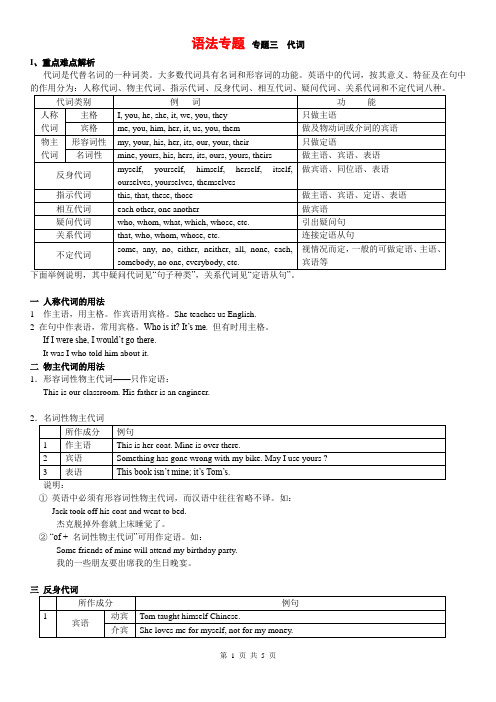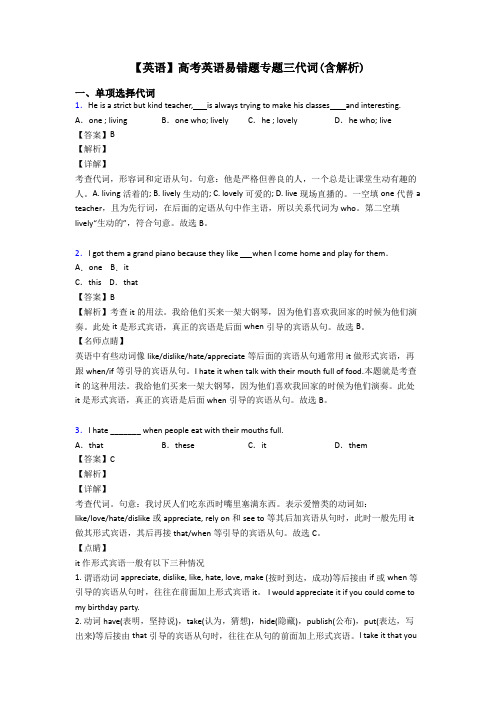专题三 代词
专题3 代词

最新版名校学习资料集锦全国各大名校资料集合专题三代词精讲常考知识考点一人称代词考点二物主代词考点三反身代词考点四指示代词考点五不定代词考点六疑问代词考点七it的用法考点一人称代词人称代词有人称、数和格的变化。
人称代词格第一人称第二人称第三人称单数复数单数复数单数复数主格I me you you he she it they 宾格we us you you him her it they人称代词的主格通常用作主语,宾格则用作宾语或表语。
I like table tennis. 我喜欢乒乓球。
(作主语)Do you know him? 你知道他吗?(作宾语)—Who’s knocking at the door?谁在敲门?—It’s me. 是我。
(作表语)注意:⑴I作“我”讲时,需要大写。
⑵we,you,they可以泛指一般人;she常用来代指国家、月亮、大地等。
⑶人称代词并列时的顺序:单数人称:you →he / she →I;复数人称:we →you →they;男女两性并列:he →she。
【用法口诀】人称代词分两格,主格宾格来分说;主格定把主语作,宾格作宾不会错。
【典例精析】1. He Jiong is a famous TV station host. __________ does well in making jokes.A. HisB. HimC. He解析:句子缺少主语,因此需要主格代词he来充当。
答案:C。
2. We have noticed the problems, __________ and will be discussed at the meeting.A. youB. itC. theyD. us解析:上文的problems是复数,所以用they来代替以避免重复。
答案:C。
3. Han Han is very popular among the teenagers. We all like __________.A. himB. heC. hisD. himself解析:him宾格;he主格;his形容词性物主代词;himself反身代词。
2024年新高考版英语专题三代词 讲解部分

二、名词性物主代词 名词性物主代词不能用于名词之前,其形式取决于所指代的名词。
它相当于“形容词性物主代词+名词”,在句中作主语、表语和宾语。 1.作主语 This is not my dictionary. Mine is lent to Lucy.这不是我的词典。我的借给 露西了。 2.作表语 This camera is mine and that is yours. 这部照相机是我的,那部是你的。
考点四 指示代词 用来指示或标记人或事物的代词,表示“这个/些”“那个/些”。常 用的指示代词有this,that,these,those。this,that是单数;these,those是复数。 一、指示代词的句法功能 1.作主语 The real problem was the pronunciation. That was too hard for me. 真正的问题就是发音。那对于我来说太难。 2.作定语 These books are intended for Senior Three. 这些书是供高三用的。
3.作宾语 We'll have to separate ours from theirs. 我们得把我们的和他们的分开。 温馨提示 “of+名词性物主代词”可用作定语,常用于“a/an/this/that/these/those/ some/any/several/no/each/every/such/another+名词+of+名词性物主代词” 结构。 I am an admirer of yours. 我是你的崇拜者。 This baby of hers is so lovely!她的这个宝宝很可爱!
温馨提示 1.在电话中交谈时常用主格形式代替宾格形式。 —Is that Mr. Li?是李先生吗? —Yes, this is he.是的,我就是。 2.在非正式英语,尤其是口语中,人称代词作be的表语时,通常用其宾格形 式。 3.在It is/was...that/who...强调句型中,若被强调部分作主语,虽然跟在is/ was后,也用主格形式。 It was I who did it.这件事是我做的。
语法3-代词

语法专题专题三代词I、重点难点解析代词是代替名词的一种词类。
大多数代词具有名词和形容词的功能。
英语中的代词,按其意义、特征及在句中下面举例说明,其中疑问代词见“句子种类”,关系代词见“定语从句”。
一人称代词的用法1 作主语,用主格。
作宾语用宾格。
She teaches us English.2 在句中作表语,常用宾格。
Who is it? It’s me. 但有时用主格。
If I were she, I would’t go there.It was I who told him about it.二物主代词的用法1.形容词性物主代词——只作定语:This is our classroom. His father is an engineer.2说明:①英语中必须有形容词性物主代词,而汉语中往往省略不译。
如:Jack took off his coat and went to bed.杰克脱掉外套就上床睡觉了。
② “of + 名词性物主代词”可用作定语。
如:Some friends of mine will attend my birthday party.我的一些朋友要出席我的生日晚宴。
四指示代词的用法1.时空的差别e.g. There is this seat here, near me, or there is that one in the fourth row. Which will you have, this or that?2. This 和that 在行文叙述上的差别。
E.g.I shall say this to you: he is a poor man. He was ill. That’s why he didn’t come.3.that 和those 用于表比较的结构。
The weather of Zhanjiang is better than that of my hometown. TV sets made in Nanjing are better than those made here.4. 打电话时this 表示我,that表示你.五不定代词的用法1.none, no one, nothing 的用法区别1)none 既可指人,也可指物,且一定是特指概念,常用来回答how many /much 引导的疑问句;no one 只能指人,且只能是泛指概念,常用来回答who 引导的疑问句;nothing “什么也没有”,否定一切,常用来回答what 引导的疑问句。
【英语】高考英语易错题专题三代词(含解析)

【英语】高考英语易错题专题三代词(含解析)一、单项选择代词1.He is a strict but kind teacher, is always trying to make his classes and interesting. A.one ; living B.one who; lively C.he ; lovely D.he who; live【答案】B【解析】【详解】考查代词,形容词和定语从句。
句意:他是严格但善良的人,一个总是让课堂生动有趣的人。
A. living活着的; B. lively生动的; C. lovely可爱的; D. live现场直播的。
一空填one代替a teacher,且为先行词,在后面的定语从句中作主语,所以关系代词为who。
第二空填lively“生动的”,符合句意。
故选B。
2.I got them a grand piano because they like when I come home and play for them.A.one B.itC.this D.that【答案】B【解析】考查it的用法。
我给他们买来一架大钢琴,因为他们喜欢我回家的时候为他们演奏。
此处it是形式宾语,真正的宾语是后面when引导的宾语从句。
故选B。
【名师点睛】英语中有些动词像like/dislike/hate/appreciate等后面的宾语从句通常用it做形式宾语,再跟when/if等引导的宾语从句。
I hate it when talk with their mouth full of food.本题就是考查it的这种用法。
我给他们买来一架大钢琴,因为他们喜欢我回家的时候为他们演奏。
此处it是形式宾语,真正的宾语是后面when引导的宾语从句。
故选B。
3.I hate _______ when people eat with their mouths full.A.that B.these C.it D.them【答案】C【解析】【详解】考查代词。
语法专题三 代词与it的用法

语法专题三代词与it 的用法[考点解析]1.人称代词人称代词主要用来指代表示人的名词或名词词组. 有人称, 数, 性和格的区别, 在句中可作主语, 宾语或表语. 人称代词的宾语可用作非限制动词的主语或者单独出现. 例如:You will hurt yourselves with those knives. It never occurred to me to doubt him.--Who is knocking at the door? --It’s me.--Who did it? --Me.2.物主代词物主代词分为形容词性物代词和名词性物主代词. 形容词性物主代词只能和名词连用, 对名词起限定作用. 名词性物主代词在意思上相当于“形容词性物主代词+名词”, 在句中起名词作用, 作主语, 宾语和补语. 例如:His hat is the brown one.Ours (Our house) is the only house here that is being painted.I left my camera at home. You can use hers (her camera).3.指示代词指示代词可在句中作主语, 宾语和起限定作用. 例如:Those present at the meeting included the mayor and mayoress and the local member ofparliament.--Shall we buy this book or that one?I like that one.4.反身代词反身代词是用后缀-self (复数-selves)加上第一人称, 第二人称的形容词性物主代词, 或者加上第三人称代词的宾格形式构成的。
可在句中作宾语, 表语或同位语, 也可由并列连词连接, 与另一词并列作主语. 例如:Tom and Ann blamed themselves for the accident.Frank is not quite himself today.She liked the diamond itself but not the setting.My wife and myself were invited to the party.5.相互代词表示相互关系的代词称为相互代词, 只有each other和one another, 它们表示句中动词所叙述的动作或感觉在涉及的各个对象之间是相互存在的.在现代英语中,它们可以替换使用.例如:We have known each other since we were children.They looked at one another, in hatred and despair.6.疑问代词疑问代词常用于特殊疑问句中, 一般放在句首, 并在句中作某一句子成分, 可作主语, 宾语, 表语和定语. 疑问代词都可用作连接代词, 引导名词性从句(主语从句, 宾语从句和表语从句). 例如:Who is going to speak to us tomorrow? What do you usually have for lunch?What is the matter? Don’t you feel well? Whose umbrella is this?Tell me who he is.7.关系代词关系代词是用来引导形容词性从句的, 有主格, 宾格和所有格, 也有人称和非人称之分. 例如:He that would eat the fruit must climb the tree.Tom spent four years in college, during which time he learned French.The house whose windows are broken is unoccupied.8.不定代词不指明代替任何特定名词的代词叫做不定代词. 常见的不定代词有all, both, each, every等.以及含有some-,any-,no-等的合成代词, 如:anybody, something, no one. 这些不定代词大都可以代替名词和形容词,在句中作主语, 宾语,表语和定语, 但none和由some, any, no等构成的复合不定代词只能作主语, 宾语或表语; every和no只能作定语. 如:One should learn to think of others.He gave every patient the same medicine.All the students have come.上述知识可归纳如下:(1)人称代词主格I, you, he, she, it, we, you, they宾格me, you, him, her, it, us, you, them(2)物主代词形容词性my, your, his, her, its, our, your, their名词性mine, yours, his, hers, its, ours, yours, theirs(3) 指示代词this, that, these, those, such, same(4) 反身代词myself, yourself, himself, herself, itself, ourselves, yourselves, themselves(5) 相互代词each, other, one, another(6) 疑问代词who, whom, whose, which, what, whoever, whichever, whatever(7) 关系代词that, which, who, whom, whose, as(8) 不定代词one/some/any, each/every, none/no, many/much, few/little/a few/a little, other/another, all/both, neither/eitherthe use of “It”一. 代词1. it的基本用法是用来指代上文所提到的事物. 如:A: Pass me a blue pen. B: Here it is.2. it, that, one, the one, the ones用于指代用法时的区别:it代替上文提及的原物(复数用they); one指代上文提及的, 泛指的可数名词单数(复数ones); that指代上文提及的定指的可数名词单数或不可数名词(复数those), the ones相当于these, those.3. 指代不明身份或性别的人也用it; 指代喜爱的事物或宠物也可以用she/he.A: Who’s it (knocking at the door)?B: It’s me.The crowd moves on. No one tries to stop it.My car needs some more petrol. Let’s fill her up.二. 虚义it:虚义it指用作没有具体语义的主语, 如表示时间, 天气, 距离, 温度等概念的用法.When spring comes, it is getting warmer and warmer.It is cooler in Tianjin than in Beijing.It is only about half an hour’s ride from here to my home.It looks as if the college is very small.It seemed as though our plan would be perfect.三.形式it:由于句法结构的需要, 常用it作形式主语, 而把真正的主语后置.1.形式主语:不定式, 动名词以及主语从句作主语时, 为避免“头重脚轻”, 要将真正的主语后置.It is/was difficult (easy, hard, important, necessary, useful, fit, possible, a pity, apleasure…) (for sb.) to do sth.;1). It is/was kind (nice, wise, clever…) (of ab,) to do sth.;比较:Sb. is/was angry (ashamed, delighted, disappointed, excited, glad, happy,pleased, proud, sorry, surprised, thankful…) to do sth.;2). It is better (interesting, tiring, enjoyable, funny, fun, a bore, a waste of time…)doing sth.;3). It is clear (plain, true, certain, sure, obvious…) that clause +陈述语气;4). It is important (necessary, strange, a pity…) +that clause +(should) do;5). It is a suggestion (my with) +that clause +(should) do;6) It is ordered +that clause+(should) do;7). Ii is high/very time that we should have lunch/had lunch here.It is the first/last time that we have had lunch here (just).It is the third time that we shall have lunch here (in a moment).2. 形式宾语: 当不定式, 动名词, that从句作宾语, 又有自己的宾语补语时, 要用it作形式宾语, 而把真正的宾语后置. 能够用于形式宾语句型的动词有think, make, find,consider, feel, take等. 如:Marx found it important to study the situation in Russia.The fisherman made it a rule that he never cast his net more than four times a day.The ancient people took it for granted that the earth was flat.We think it necessary reading aloud every morning to improve our English.四. 强调it: 为了强调句子中的某一处, 可以用“It is/was+被强调部分+that/who+其他的句型. 如:I met an old friend in the street last week.-It was I who met an old friend in the street last week. (强调主语)It was an old friend that I met in the street last week. (强调宾语)It was in the street that I met an old friend last week. 强调地点状语)It was last week that I met an old friend in the street. (强调时间状语)注意:一般强调时间不能用when, 强调地点不用where.[高考示例]【例1】2005浙江高考We’ve been looking at houses but haven’t found ______we like yetA. oneB. onesC. itD. them提示: one指代上文出现的同一类事物中的一个; 而it则指同一事或同一物.答案: A.【例2】2005福建高考I made a call to my parents yesterday. To my disappointment, ______of them answered it.A. eitherB. noneC. neitherD. nobody提示: 由to my disappointment可知, 父母中没人接电话, 故用neither表示“两者中任何一个都没/不”答案: C.【例3】2005江西高考Cars do cause us some health problems—in fact far more serious ______than mobile phones do.A. oneB. onesC. itD. those提示:替代上文出现的同类事物中的一个用one,复数用ones; 而it与that都表示特指.答案: B【例4】2005天津高考Last month, part of Southeast Asia was struck by floods, from ______effects the people are still suffering.A. thatB. whoseC. thoseD. what提示:定语从句中缺少定语, 故选关系代词whose.答案: B【例5】2005浙江高考______I explained on the phone, your request will be considered at the next meeting.A. WhenB. AfterC. AsD. Since提示: as引导定语从句, 代指主句的整个内容, 意为“正如; 就像.答案: C one与it起指代上文内容时作用不同, 同时还应注意that常用来指代不可数名词或用于比较级中[触类旁通]1. I would appreciate ______if you come to my grandma’s birthday party and say “Hello”to her.A. thatB. itC. youD. her2.I would rather buy a house in the suburb than ______in the city.A. itB. oneC. thisD. that3. ---How do you think of the film?---Wonderful, I think. Just as fine as ______of the films we have seen.A. oneB. anotherC. someD. any4. No agreement was reached in the discussion as neither side would give way to ______A. any otherB. anotherC. the otherD. other5. ______are fond of watching TV after supper, but ______prefer to go out.A. I and my family; he and his familyB. My family and I; his family and heC. I and my family; his family and heD. My family and I; he and his family6. ______breaks law should be punished. Everyone was born equal.A. AnyoneB. The personC. WhoeverD. Who7. There is something wrong with my body. I’m not feeling ______today.A. goodB. my ownC. meD. myself8. --Excuse me, but can you tell me which road I should take to the city library?--______of the four roads will do.A. AnyB. NeitherC. BothD. Every9. Although he talked like a man of sense, his actions were ______of a fool.A. theseB. thatC. thoseD. any10. The thieves ran away separately, ______carrying a bag. The police then divided into groups tofollow them immediately.A. allB. eachC. everyD. either答案: 1. B 2. B 3. D 4. C 5. D 6. C 7. D 8. A 9. C 10. B.。
超实用高考英语语法专题复习: 专题三 代词

2. It 作形式主语、形式宾语常用句型
(1)it作形式主语It is a pity/shame that... 真可惜……It is no wonder that... ……不足为奇,并不奇怪It seems/appears that... 似乎/看来……It looks/seems as if/as that... 看起来/似乎/好像……It happens that... 碰巧……
(6)Please see to it that (make sure that) you bring enough money when you go out. 出门时,请确保带足了钱。(7)You can depend upon it that he is very smart. 你就相信吧,他非常聪明。(8)As someone puts it, practice makes perfect. 正如某人所说,熟能生巧。(9)When it comes to drive,she's got more than any of us. 讲干劲,她比谁都足。(10)It is (high) time that we had/should have lunch. 该吃午饭了。(11)It is the first/second... time I have visited the place. 这是我第一/二……次参观这个地方。(12)It is/has been 3 years since he joined the army. 他参军3年了。(13)It was 3 years before he came back home. 3年了他才回家。(14)It is I who/that am right. 我是对的。
in oneself 本质上,本身by oneself 独自,单独for oneself 替自己,为自己to oneself 独自拥有的beside oneself (因情绪)失去自制力,失常adapt oneself to 适应apply oneself to 专心致志于devote oneself to 致力于,献身于,专心于make oneself at home 舒适自在,无拘束treat oneself to 招待,款待,买(可享受的东西)
高考英语专题三代词

考点三代词一、人称代词1.人称代词形式2.人称代词用法二、物主代词1.物主代词形式2.物主代词用法三、反身代词1.反身代词形式2.反身代词的基本用法四、疑问代词what的习惯用法五、不定代词1.both,all,either,any,neither,none的区别I've bought two books;you can have either.我买了两本书,你要哪本都行。
I am sorry I can't lend you any(money).对不起,我不能借给你钱。
None of this money is mine.这笔钱都不是我的。
2.one,another,the other,some,others,the others的区别注意:(1)the other后通常加可数名词(单数或复数),但不能加不可数名词;短语the rest of(剩余的)后既可以加可数名词(单数或复数),也可以加不可数名词;else一般放在不定代词或特殊疑问词后。
—What else did you do last weekend?—Oh,nothing else.——上周末你还做什么了?——哦,没做什么别的事。
(2)体会下列句子中黑体词的用法①I have two books:one is English,and is French.我有两本书:一本是英语书,一本是法语书。
②He will stay here for days.他在这里还要待上3天。
③There are many books on the table:some are English; are French.桌子上有很多书。
一些是英语书,剩下的是法语书。
④He'll be in a wheelchair for the rest of his life.他的余生将在轮椅上度过。
⑤Would you please make it ?你能改天吗?⑥I saw him in London the other day/week/month.我那天/个星期/个月在伦敦见过他。
高职院校单独招生考试英语复习指导通用版第一部分基础知识梳理专题三代词

lose oneself in(=be lost in)迷失
teach oneself 自学
look after oneself照顾好自己
enjoy oneself 玩得开心
make yourself/yourselves at home 不必拘束
behave oneself 举止得体 come to oneself 恢复知觉;苏醒过来
This is the problem I will speak in the meeting tomorrow.(代替下文要 讲的事)这就是我明天要在会 上说的问题。
考点四 指示代词
I got up late.That’s why I missed the train.(代替前面提到过的事)我起床晚了,那就是我没赶 上火车的原因。
代词
复习指南
命题探究
代词是高职院校单招考试的重点考查项目之一。对代词的考查主要集中在代词的基本用法上, 主要考查人称代词、物主代词、反身代词、指示代词、不定代词等。
考点一 人称代词 1.人称代词的主格和宾格及单复数
2.人称代词的句法功能
考点一 人称代词 3.人称代词的特殊用法
考点一 人称代词 4.it用作代词
典例剖析
3.I have a lovely pet cat.
A.It
B.This
C
name is Lazy.
C.Its
D.She
【剖析】考查代词辨析。句意为:“我有一只可爱的宠物猫。它的名字叫拉齐(Lazy)。”修饰名词na me应用形容词性物主代词,it和she都是人称代词,可排除;this(这个)表近指。根据语境可知Lazy是那 只宠物猫的名字,故选C。
典例剖析
- 1、下载文档前请自行甄别文档内容的完整性,平台不提供额外的编辑、内容补充、找答案等附加服务。
- 2、"仅部分预览"的文档,不可在线预览部分如存在完整性等问题,可反馈申请退款(可完整预览的文档不适用该条件!)。
- 3、如文档侵犯您的权益,请联系客服反馈,我们会尽快为您处理(人工客服工作时间:9:00-18:30)。
()1.Nancy and Kate are good friends.______are both from England.A. WeB. YouC. TheyD. Them( )2.Excuse me,may______ use your dictionary? ______is lost.A.I;MineB. I;MyC.my;MineD.me;My( )3.Miss Li often helps ______with our English studies.B. ourC.oursD.ourselves( )4.—Mike, who helped______make the paper plane?—Nobody! I made it all by myself.A. yourB. yoursC. youD. yourself( )5.(2010·广东)My father is ill in bed.I have to look after at home.A.heB.hisC.himD.himself考点2 物主代词( )6.Do you think driverless technology will make many workers lose ______jobs?A.themB.theirC.theirsD.they( )7.The iPad isn’t______ .It belongs to.A.he;meB.hers;mineC.his;meD.her;mine( )8.—oral English is good. Who teachs you?—Mr. Green.A.YourB. YouC.YoursD. Yourself( )9.—Would you please send best wishes to Ann? —Sure.A.IB. meC.myD. myself( )10.With help,we finished our work on time.A.theyB. themC.theirD. theirs考点3 反身代词( )11.Deng Ziqi won lots of fans for through the TV program I Am a Singer.A.sheB.herC.herselfD.hers( )12.(2013·广州)The man called his professor for help because he couldn’t solve the problem by.A.herselfB. himselfC.yourselfD.themselves考点4 不定代词( )13.(2020·广州)—Would you like tea or coffee?—,thanks!I’d prefer a coke.A.BothB. NeitherC.AllD.Some ( )14.I’m tired of doing the same thing all the time.Let’stry______new!A.anythingB. nothingC.somethingD.everything( )15.Jackie has got many adventure novels, but he has read only______of them.A.a few B.few C.little D. a little ( )16.—Which one can I take?—Oh,you can take of them.I’ll keep none.A.bothB. allC.neitherD.either考点5 指示代词( )17.—Look!What’s in the sky?—It looks like a kite.A.thisB. thatC.thoseD.these( )18.The pears in my basket are smaller than in Jim’s.A.itB. thatC.thisD.those考点6 疑问代词( )19.—is your car?—The red one in front of the tree.A.WhoseB. WhichC.WhatD.Who ( )20.—is your mother?—She is a reporter.A.WhoseB. WhichC.WhoD.What( )1.(2020·北京)My brother will come to see me tomorrow. I’ll meet at the airport.A. herB. youC. himD. them ( )2.(2020·上海)The retired couple have decided to go to college. It’s time for to begin a new life.A.theyB.themC.theirD.theirs ( )3.(2020·天津)I can’t find my ticket. I think I have lost.A. ItB. oneC. thisD. them ( )4.(2020·重庆)—Do you like watching ping-pong matches?—Yes, and favorite ping-pong player is Ma Long.A. weB. usC. ourD. ours ( )5.(2020·河南)—What a bad day!—Everyone has one of those days when goes right.A.nothingB. anythingC. everythingD. something( )6.(2020·河北)Thanks for inviting to dinner, Nancy. I really enjoyed it.A. herB. himC. youD. me ( )7.(2020·安徽)Helen has got two brothers. of them likes chocolate, but she loves it.A. NeitherB. NoneC. EachD. Any( )8.(2020·陕西)Good words can touch not only your heart but also .A. lB. myC. myselfD. mine ( )9.(2020·福州改编)—I can’t find my eraser.May I use ? —Of course.A.youB.yourC.yoursD.yourself( )10.(2020·黄冈)—What do you think of Chinese teacher, Jim?—She’s an excellent teacher. I’ve improved a lot since she taught______Chinese.A.our; usB. our; ourC. ours; usD. ours; our( )11.(2020·青岛)—do you usually share happiness with? —My parents and my best friend.A. WhoB. WhoseC. What . How( )12.(2020·沈阳)Many people find that listening to some good music helps when they are low.A. usB. youC. themD. it( )13.(2020·无锡)—I can’t find the magazine I bought this morning.—Well, Jack is reading over there. Why not go and see if it is yours?A. itB. thatC. oneD. some( )14.(2020·荆门)—Alice,how do your parents like pop music? —my dad my mom likes it.But they both prefer Beijing Opera.A. Either ;orB. Neither;norC. Not only;but alsoD. Both;and( )15.(2020·黔东南州)The girl has lost pen.Will you lend her ?A. his ;yourB. her;yoursC. she;yoursD. her;your( )16.(2020·呼和浩特)—There is no salt left.Jim.Would you like to get ?—OK,Mum.A. itB.oneC. someD.any ( )17.(2020·滨州)—Don’t be angry with your kid when he makes a mistake again,will you?—No,I won’t.I know that of us are perfect after all.A.noneB.neitherC.each D.all( )18.(2020·海南改编)—When shall we send the washing machineto you,Mrs.Red ?—on Thursday on Friday,please.I’ll be at home then.A. Either ;orB. Neither;norC. Both;andD. Not only;but also( )19.(2020·济宁)—What a nice model plane!—Thanks.I made it with 3-D printer by .A.me B.him C.itself D.myself ( )20.(2020·包头)For the first time, I found great fun to achieve something through hard work.A. itB. thatC. thisD. one专题三代词A组:1.C 2.A 3.A 4.C 5.C 6.B 7.C 8.A 9.C 10.C11.C 12.B 13.B 14.C 15.A16.B 17.B 18.D 19.B 20.DB组:1.C 2.B 3.A 4.C 5.A 6.D 7.A 8.D 9.C 10.A11.A 12.C 13.C 14.B 15.B16.C 17.A 18.C 19.D 20.A。
